SYNTAX for Class 10 ENGLISH
What is Syntax?
Syntax is the arrangement of words in sentences. Syntax is the grammatical structure of sentences. The format in which words and phrases are arranged to create sentences is called syntax.
वाक्यों में शब्दों की व्यवस्था को syntax कहते हैं। वाक्य रचना वाक्यों की व्याकरणिक संरचना है। वाक्य बनाने के लिए शब्दों और वाक्यांशों को जिस प्रारूप में व्यवस्थित किया जाता है उसे syntax कहा जाता है।
What is Subject?
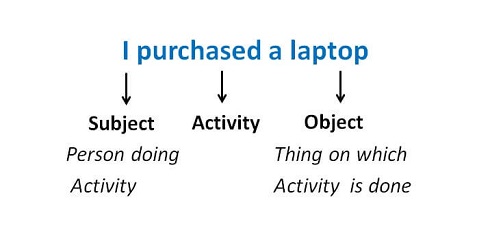
The person doing the work in any sentence or the person doing the work is called the subject.
किसी भी sentence में कार्य करने वाले को या कार्य को अंजाम देने वालो को subject कहा जाता है I
For Example
1) We are going to market.
1) हम बाज़ार जा रहे हैं।
What is Verb?
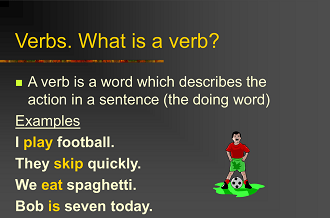
A verb is a word that in syntax conveys an action, an occurrence, or a state of being.
Verb is divided into two parts on the basis of usage in Sentence.
1) Helping Verb
2) Main Verb
Verb उस शब्द को कहा जाता है जिससे किसी कार्य को करने या होने का बोध होता है I
Sentence में प्रयोग के आधार पर Verb को दो भागो में बांटा गया है I
1) Helping Verb
2) Main Verb
For Example
1) You were a great singer.
1) आप एक महान गायक थे।
Subject- Verb Agreement (Syntax Rules)
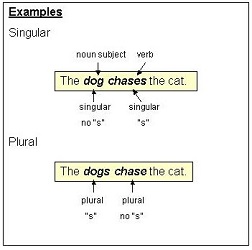
Singular verb is always used with singular subject and plural verb is always used with plural subject; this subject-verb agreement is called syntax.
Singular subject के साथ हमेशा singular verb का प्रयोग किया जाता है और plural subject के साथ हमेशा plural verb का प्रयोग किया जाता है, इस subject – verb agreement को syntax कहते है I
For Example
1) The mango is very sweet. (आम बहुत मीठा होता है।) – Correct
2) The mango are very sweet – Incorrect
RULE- 1
When two Nouns are joined by 'and' then it becomes Plural Number and Plural Verb is used. When two Nouns are joined by 'and' both have the same Sense then Verb will be Singular.
जब दो Noun 'and' से जुड़े हो तो plural Number हो जाता है और Plural Verb का प्रयोग किया जाता है जब दो Noun 'and' से जुड़े हो एवं दोनों का Sense एक ही है तो Verb Singular होगा I
For Example
1) Ram and Mohan are going to Patna. (Plural Verb)
1) राम और मोहन पटना जा रहे है।
2) Butter and bread is made. (Singular Verb)
2) मक्खन और रोटी बनाई जाती है।
RULE- 2
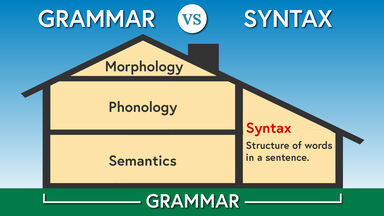
Each, every, either, neither, no, none, everybody, somebody, nobody, anybody, everything, something, nothing, anything, everyone, someone, none, anyone are singular words, and, therefore, singular verbs are used with these words.
Each, every, either, neither, no, none, everybody, somebody, nobody, anybody, everything, something, nothing, anything, everyone, someone, none, anyone सभी Word singular है, इसलिए इन शब्दों के साथ Singular verb लगता है।
For Example
1) Each student had come.
1) हर छात्र आया था।
RULE- 3
If each, every, either, neither, one, everyone, anyone, no one, someone, somebody, nobody, much, a little, little etc is used as a subject, then singular verbs will be used.
यदि sentence में subject के रूप में each, every, either, neither, one, everyone, anyone, no one, someone, somebody, nobody, much, a little, little etc. रहे तो singular verb का प्रयोग होगा I
For Example
1) Each of them is guilty.
1) वहाँ हर कोई दोषी है।
RULE- 4
If two Subjects are joined using neither….nor, either…. or, not only…., but also, nor, or none, then the verb should be used according to the nearest subject.
यदि दो Subject को neither…..nor, either…. or, not only…. but also, nor, or या none-but से जोड़ा जाए, तो verb नजदीक वाले Subject के अनुसार प्रयोग होना चाहिए I
For Example
1) Neither Ram nor Shyam has come.
1) न राम आया है और न ही श्याम आया है।
RULE- 5
If in a sentence the subject is joined by the words like with, together with, along with, as well as, and not, like, unlike, including, excluding, but, except, or besides, then the verb is used according to the words that are used before these words.
यदि किसी sentence में subject – with, together with, along with, as well as, and not, like, unlike, including, excluding, but, except, या besides के द्वारा जुड़ा रहे, तो verb का प्रयोग इन words के पहले प्रयुक्त होने वाले word के अनुसार होगा I
For Example
1) He as well as his children are honest.
1) वह और उसके बच्चे ईमानदार हैं।
RULE- 6
If in the sentence, both, many, several, few, a few these, those, two, there, four, etc are used as a subject then the plural verb will be used with it.
यदि sentence में subject के रूप में both, many, several, few, a few these, those, two, there, four, etc. रहे तो इसके साथ plural verb का प्रयोग होगा I
For Example
1) Both of them are guilty.
1) ये दोनों दोषी हैं।
RULE- 7
If two Subjects are joined using neither….nor, either…. or, not only…., but also, nor, or none, then the verb should be used according to the nearest subject.
यदि दो Subject को neither…..nor, either…. or, not only…. but also, nor, or या none-but से जोड़ा जाए, तो verb नजदीक वाले Subject के अनुसार प्रयोग होना चाहिए I
For Example
1) Neither Ram nor Shyam has come.
1) न राम आया है न ही श्याम आया है।
Advance Syntax Rules
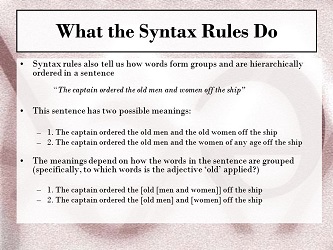
Some words are both Noun and Plural, but they are singular in meaning, so Singular Verb is used with them.
कुछ शब्द Noun और Plural दोनों होते है, लेकिन अर्थ में वह singular होते है इसलिए इनके साथ Singular Verb का प्रयोग किया जाता है।
For Example
1) Mathematics is an interesting subject.
1) गणित एक दिलचस्प विषय है।
RULE- 8
Singular Verb is always used with Collective Noun.
Collective Noun के साथ हमेशा Singular Verb का प्रयोग किया जाता है।
For Example
1) The herd of cows is grazing in the field.
1) गायों का झुंड खेत में चर रहा है।
RULE- 9
When a noun is such that it indicates a certain distance, time, quantity, amount or weight, it is used with a singular verb even though it is plural.
जब कोई noun ऐसा हो जो निश्चित दुरी, समय, मात्रा, रकम या वजन को बतलाता हो, तो plural होने पर भी इसके साथ singular verb का प्रयोग किया जाता है I
For Example
1) Ten hours is enough for the work.
1) काम करने के लिए दस घंटे बहुत हैं।
RULE- 10
When two numbers are connected by – 'and', then often singular verb is used.
जब दो number – 'and' से जुड़ा रहे तो अक्सर singular verb का ही प्रयोग किया जाता है I
For Example
1) Two and three is five.
1) दो और तीन पाँच होते है।
RULE- 11
When 'the' is preceded by an adjective in a subject, a plural verb will be used.
जब किसी subject में adjective के पहले ‘the’ लगा हो तो plural verb का प्रयोग किया जाएगा I
For Example
1) The poor are honest.
1) गरीब ईमानदार हैं।
RULE- 12
In sentences starting with ‘there’, verbs are used according to their actual subject.
’There’ से start होने वाले sentences में verb का प्रयोग उनके असली subject के अनुसार होता है I
For Example
1) There is a boy.
1) वहां एक लड़का हैं।
RULE- 13
A number of/ A large number of/ A great number of is used with Plural Countable Noun, therefore, Plural Verb is used with this noun.
A number of/ A large number of/ A great number of का प्रयोग Plural Countable Noun के साथ होता है तथा इसके साथ Plural Verb का प्रयोग होता है I
For Example
1) A number of students were present.
1) काफी संख्या में छात्र मौजूद थे।
RULE- 14
Furniture, advice, work, evidence, equipment, news, information, luggage, baggage, percentage, poetry, knowledge, dirt, dust, traffic, electricity, music, breakage, stationery, scenery, confectionery, pottery, bakery, crockery, behaviour is used in the form of Uncountable Nouns, hence Singular Verb is used with it.
Furniture, advice, work, evidence, equipment, news, information, luggage, baggage, percentage, poetry, knowledge, dirt, dust, traffic, electricity, music, breakage, stationery, scenery, confectionery, pottery, bakery, crockery, behavior का प्रयोग Uncountable Nouns के रूप में होता है इसलिए इसके साथ Singular Verb का प्रयोग होता है I
For Example
1) The scenery of Kashmir has enchanted me.
1) कश्मीर का नज़ारा मंत्रमुग्ध कर देने वाला है।
RULE- 15
Some Nouns seem singular in appearance, but they are always used in plural like; Cattle, cavalry, infantry, poultry, peasantry, children, gentry, police, people. 's' is never put with them, as it is wrong to write cattles, childrens.
कुछ Nouns दिखने में Singular लगते है, लेकिन इनका प्रयोग हमेशा plural में होता है जैसे; cattle, cavalry, infantry, poultry, peasantry, children, gentry, police, people, इनके साथ कभी भी ‘s’ नहीं लगाया जाता है जैसे- cattles, childrens लिखना गलत है I
For Example
1) Cattle are grazing in the field.
1) खेत में मवेशी (cattle) चर रहे हैं।
FILL IN THE BLANKS
Fill in the blanks with suitable form of verbs given in brackets.
1) He was tired and __________asleep immediately. (Fall, fell)
2) We shall go out as soon as you _____________ ready. (Are, were)
3) She said she would go on knitting as long as she ______________ on the chair. (Has been sitting, was sitting)
4) He died after he _. ill a long time. (Has been, had been)
5) He _____________ in the last war. (Has been killed, was killed)
6) Each of these producers___ his own advantage, (has, have)
7) Ten miles___ long distance, (is, are)
8) Many a student _______________ hard to pass his entrance exam, (try, tries)
9) The furniture in his house_______________ impressive, (look, looks)
10) Few students__________________. present in the class today, (is, are)
11) Ritesh, my best friend_______________ leaving for Japan next week, (is, are)
12) Most of my friends______________ government employees, (is, are)
13) The level of intoxication_______________ from subject to subject, (vary, varies)
14) Either boys or girls______________ telling lies, (is, are)
15) A number of people_______________. reported to be missing in the train accident at Jhansi. (Was, were)
ANSWERS:
1) fell
2) are
3) was sitting
4) had been
5) was killed
6) has
7) is
8) tries
9) looks
10) are
11) is
12) are
13) varies
14) are
15) were
CHOOSE THE RIGHT OPTION
Choose the right form of verb from the given options.
1) The pots on the table is/are beautiful.
2) The detectives are/is investigating the case.
3) One of the diamonds was/were stolen.
4) A number of videos have/has been deleted from the phone.
5) Two hundred rupees seem/seems a fair price for 2 bricks of ice cream.
6) None of these flowers grow/grows well inside the house.
7) Not everyone want/wants to learn more and more.
8) Neither of these printers’ work/works properly.
9) Each of the employees is/are going to get a trip as a gift.
10) Bread and eggs is/are my favourite.
11) The style and colour of trouser are/is best for you.
12) One of you has/have to take the responsibility of the kid.
13) What does/do a pair of jeans cost?
14) Don’t you think oil in America cost/costs much less than in India.
15) Nine and nine make/makes eighteen.
ANSWERS:
1) Are
2) Are
3) Was
4) Have
5) Seems
6) Grows
7) Wants
8) Work
9) Is
10) is
11) are
12) Has
13) Does
14) Costs
15) Makes